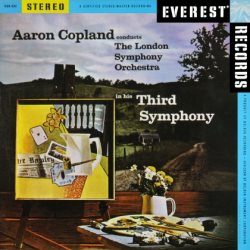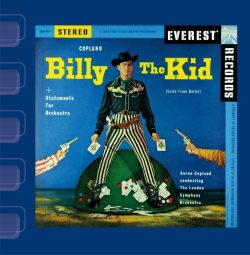| 
Support us financially by purchasing this from |
 |

Support us financially by purchasing this from |
 |
|
Aaron COPLAND (1900-1990)
Symphony no. 3 (1944-46) [40.20]
London Symphony Orchestra/Aaron Copland
rec. Walthamstow Assembly Hall, London November 1958
EVEREST SDBR3018 [40.20]
Ballet Suite: Billy the Kid (1939) [19.07]
Statements for Orchestra (1942) [17.46]
London Symphony Orchestra/Aaron Copland
rec. Walthamstow Assembly Hall, London, November 1958.
EVEREST SDBR3015 [36.53]
The first thing readers might notice is the relatively short playing
time of each of these CDs at 40 minutes or less. This is short change indeed these
days and one might well wonder why the content of this reissue could not
have been combined to form one composite album.
For those unfamiliar with the history of Everest recordings these were
made with state of the art recording equipment (Ampex) of 1958. The master
tapes were used in the digital transfers for these new CD reissues. The
sound quality is amazing: such silken smoothness on the strings and such
brio and clarity from the brass. Added to this is the authority of the
composer’s own reading of his Third Symphony.
Copland was commissioned to write his Third Symphony by the Koussevitzky
Music Foundation. Initial plans were laid down in 1943 but composition
did not begin until the August of the following year. The Symphony follows
immediately after Copland’s Appalachian Spring which is
also on Everest (SDBR 3002). Much of the character of that work
is found in this Symphony.
Copland said of his Third Symphony that he had nothing specific in mind
when he wrote it but listeners will doubtless think of that over-worked
expression ‘Americana’. As the fourth movement gets under
way they may recognise Copland’s Fanfare for the Common Man which he wrote in 1942 for a series of wartime fanfares - recorded complete
on Koch-International in 2001. This work seems to sum up all the attributes
of the America that we, across the pond, have come to recognise through
countless movies and TV series: the mighty skyscrapers and the grand open
prairies; the homely folk traditions, the rodeos, the pride and the warm
nostalgia. All of these seem implicit in this energetic, thrusting jazzy
music which is relieved at times by serene episodes bathed in a warm,
golden glow.
Copland wrote the music for Billy The Kid in response to a commission from the American Ballet Caravan in 1938. He accepted with some misgivings for he had no love of cowboy music and songs. During the time he worked on the ballet music his attitude changed and gradually literal or disguised references to cowboy songs began to appear in his score. The first performance of the ballet, Billy the Kid, was in Chicago in October 1938. Then, in 1939, Copland compiled his suite from this ballet music. There is colour and vitality and human tragedy aplenty here. The suite begins with a pastoral evocation ‘The Open Prairie’. This is in the form of a crescendo. One might suppose the scene is the dawning light over the great plains. Maybe one hears Indian and animal calls through horn and woodwind echoes. This all culminates in a sense of wonder and magnificence on contemplation of the vastness and beauty of the great vista. Scene Two is ‘Street in Frontier Town’ beginning in perky, joyous Latin dance figures and complex cross-rhythms all dazzling and vibrant. Near the end of its six plus minutes duration, the mood changes as a gun fight develops and Billy’s mother is killed presumably by a stray bullet and Billy knifes her slayers. He is now on the run from Pat Garrett’s posse. A ‘Card Game at Night’ forms a brief calm nocturne interlude which is rudely interrupted by ‘Gun Battle’. This is very realistically portrayed with accent on heavy use of all types of percussion. ‘Celebration of Billy’s Capture’ is just that – jaunty, braggadocio and jazzy. The suite ends as it began with another evocation of the ‘Open Prairie’, again mixing sentimentality with picturesque splendour.
Copland’s Statements for Orchestra was first performed in its entirety by Dimitri Mitropoulos and the New York Philharmonic on 7 January 1942. Copland’s musical definition of a Statement is an indication, a terse orchestral movement of a well-defined character summed up by the six Statements: ‘Militant’, ‘Cryptic’, ‘Dogmatic’, ‘Subjective’, ‘Jingo’ and ‘Prophetic.’ The ‘Militant’ music is arrogant, aggressive and domineering. The ‘Cryptic’ for brass and flute only is enigmatic, mysterious and unsettling with much growling brass. ‘Dogmatic’ is pedantic and overbearing. ‘Subjective’, scored for strings alone, is gentler and more reflective but there is also a sense of isolation and disdain. I was reminded of Bernard Herrmann’s film music but this would surely have been a pre-echo; maybe Herrmann knew it? ‘Jingo’, music for full orchestra, is cheeky, perky and playful. Finally, ‘Prophetic’ is rhapsodic in nature and has a chorale-like melody for solo trumpet - but bass drum and brass sound a warning.
Welcome returns in excellent sound. Not over-generous
time-wise but worth every dollar.
Ian Lace
 |
 |
|














